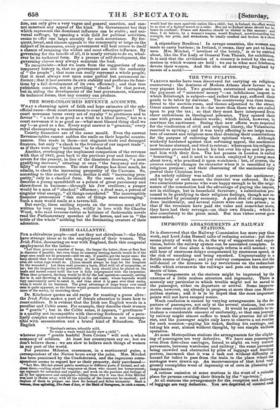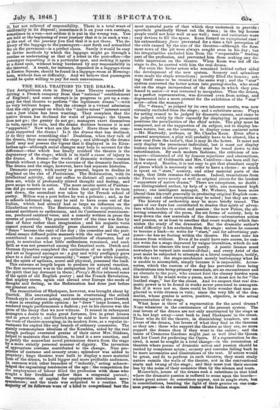IMPROVED ARRANGEMENTS AT RAILWAY STATIONS.
Iv is discovered that the Railway Commission has more pay than work, and Lord John Russell talks of reducing salaries : yet there seems plenty of work to do, in the way of suggestion and supervision, before the railway system can be accounted complete. In the matter of time alone a thorough reform is still needed : we still hear of enormous delays compensated by enormous speed, at the risk of smashing and being smashed. Unpunctuality is a fertile source of danger; and yet railway companies have not the self-denial or the firmness to lay restrictions on the redundant traffic which overcrowds the railways and. puts out the arrangements of time.
The arrangements at the stations might be improved by the exercise of a little zealous attention and ingenuity. There is scarcely any particular in which trouble might not be saved to the passenger, either on departure or arrival. Some improve ments, however, art already in progress at more than one Metropolitan station; add. it is to be hoped that the most important points will not have escaped notice. Much confusion is caused by varying arrangements in the de parture of passengers, not only at the several stations, but even at the same station at different times. It would be possible to introduce a considerable amount of uniformity, so that one journey by railway might almost suffice to teach the practice for all the rest, and the passenger might only have to observe a set routine for each occasion—paying his ticket, finding his carriage, and taking his seat, almost without thought, by one simple uniform operation. At some Metropolitan stations the arrangements for the alighting of passengers are very defective. We have seen passengers, even from first-class carriages, forced to alight on very narrow pavements, between warehouse and railway ; the same pavement being crowded and obstructed by piles of luggage and bustling porters, insomuch that it was a task not without difficulty nr hazard for ladies to pass from the train to the place where the carriages were drawn. up. An inconvenience of that kind veil grossly exemplifies want of ingenuity or of care in planning arrangements. A serious omission at some stations is the want of a suitable place, for persons awaiting their friends by the " up4rain." At all stations the arrangements for the reception and delivery of luggage are very defective. You are deprived of control over it but not relieved of responsibility. There is a total want of uniformity in its disposal; sometimes it is on your own carriage, sometimes in a van—not seldom it is put in the wrong van. You are told at the beginning of your journey that it is in such a van ; at the end of the journey you find that it is not there. The delivery of the luggage to the passengers—cast forth and scrambled for on the pavement—is a perfect chaos. Surely it would be easy to devise methods by which the luggage might go through a routine as undeviating as that of a letter in the post-office—the passenger depositing it in a particular spot, and seeking it again at a fixed spot, without being burdened by any responsibility in the interval. A trunk, for instance, deposited in a luggage-room at Euston Square, should be found in a luggage-room at Birmingham, without fuss or difficulty. And we believe that passengers would be quite willing to pay for such convenience.



























 Previous page
Previous page